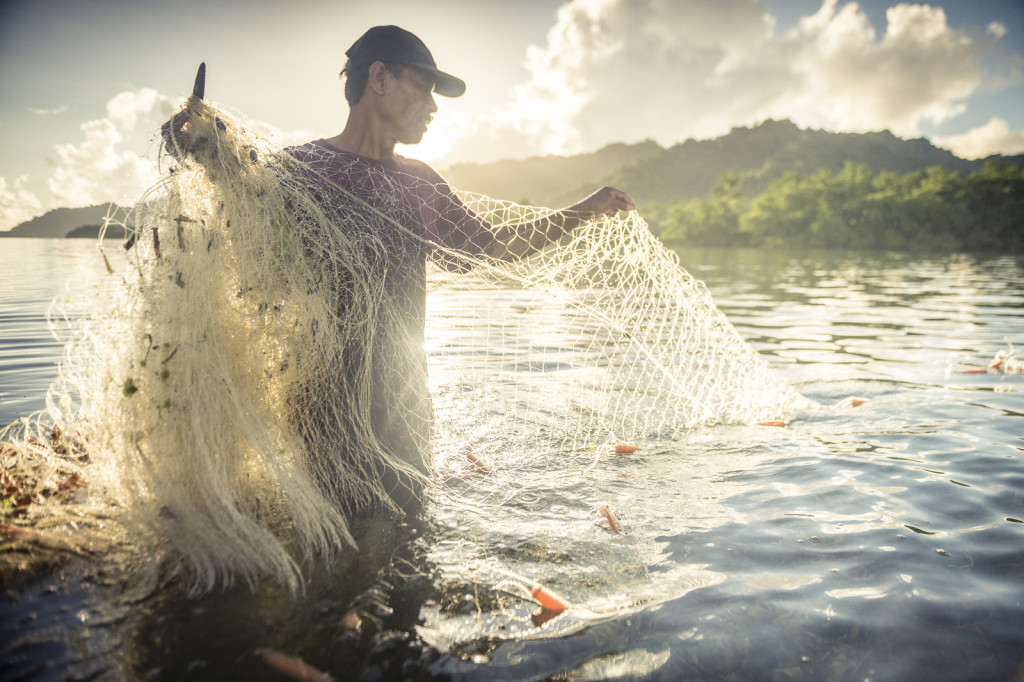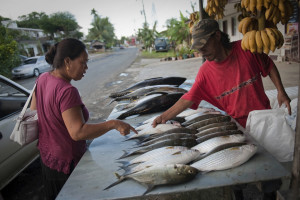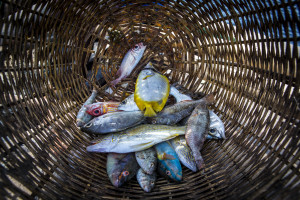Importance of Reef Fisheries
Marine fisheries are a crucial source of food and income for people around the world. Approximately one billion people, many of whom are in developing countries, rely on fish as their primary source of animal protein. ref
Coral reefs serve as habitat for many important fish, shellfish, and other invertebrates that are targeted for fishing. In the United States, approximately half of all federally managed fisheries, both commercial and recreational, depend on coral reefs and related habitats, such as seagrasses and mangroves, for a portion of their life cycles.

Fisher on the reef in front of the Yela forest on the island of Kosrae, Micronesia. Photo © Nick Hall
Research indicates that coral reef fisheries provide billions of dollars to the economies of many countries around the globe. ref Coral reef fisheries are worth $6.8 billion a year globally, ref and over $100 million per year in the United States. ref
Coral reef fisheries provide:
- income, food, and recreation,
- significant cultural and spiritual importance,
- important ecological functions for coral reefs (e.g., herbivory), supporting reef health,
- an important social safety net for people when other sources of employment are unavailable.
It is essential to communicate to stakeholders why coral reef fisheries are valuable and in need of management. The information below highlights some of the benefits of coral reef fisheries.
Benefits of Coral Reef Fish

Reef fish on display at one of the fish market stalls in Kolonia, the capital city of Pohnpei. Photo © Nick Hall
Coral reef fisheries are worth $6.8 billion a year globally. ref
Reef fisheries in Southeast Asia generate $2.4 billion a year, ref and in the Caribbean $395 million a year. ref
Coral reef commercial and recreational fisheries in the US are each valued at over $100 million per year. ref In the United States, approximately half of all federally managed fisheries depend on coral reefs and related habitats for a portion of their life cycles.
Spiny lobsters are the primary fishery for 24 countries in the Caribbean and contribute significantly to export income for the region. ref
Reef-associated exports are valued at more than 1% of total exports in 21 countries and territories, and more than 15% of total exports in six other countries. ref

A woven basket contains the day's catch. Photo © Tim Calver
More than one billion people benefit directly from coral reef resources for food and as a source of income through activities related to fishing and tourism. ref It is estimated that coral reef fisheries supply more than half of the protein consumed by people in coastal tropical regions. They are also an important source of other nutrients, such as vitamins A, B, and D, calcium, iron, and iodine. ref A healthy, well-managed reef can yield between 0.2 and 40 tons of seafood per km2 per year, with an average of about 5 tons of seafood per km2 per year. ref This translates to an annual yield of 1.42 million tons of seafood from coral reefs worldwide Across reef nations and territories, people consume an average of 29 kg of fish and seafood each year. ref Global fish consumption of reef fish is highest in the Maldives (180 kg/person), where it provides 77% of dietary animal protein. The remaining nine of the top ten consumers are island countries and territories in the Pacific, a region where average consumption (57 kg/person) is nearly twice the global average. ref These estimates take into account fish consumption by the tourist population visiting island states.

Reefs can provide livelihoods and resources that many communities depend on. The Kia community builds homes directly over their reef in the Solomon Islands because of the lack of flat, coastal lands. Photo © Djuna Iveriegh
There are an estimated 15 million small-scale fishers in the Coral Triangle when full-time, part-time, and seasonal male and female fishers are included. ref
Reef fishers in Indonesia, Philippines, India, Vietnam, and China are estimated to number between 100,000 and more than 1 million per country. ref
Approximately 300,000 people are employed in the Caribbean fisheries sector. ref
Reef fisheries are mostly small-scale and artisanal, and many are open-access systems with relatively low entry costs, making them particularly attractive to poor and migrant people. ref
The highest relative involvement in reef fishing (40% of the population) is reported from New Caledonia. The Turks and Caicos Islands, the Maldives, and Dominica are also among the nations with a significant proportion of reef fishers (5–7% of the population). ref
